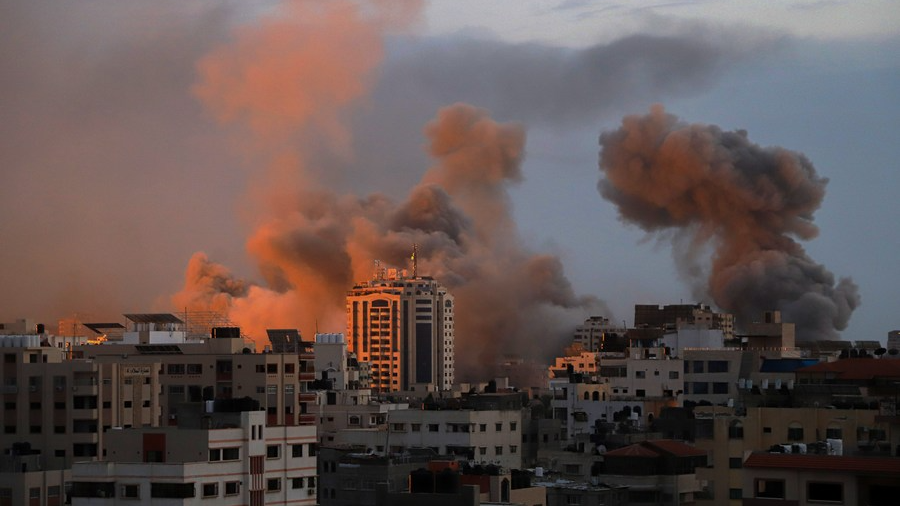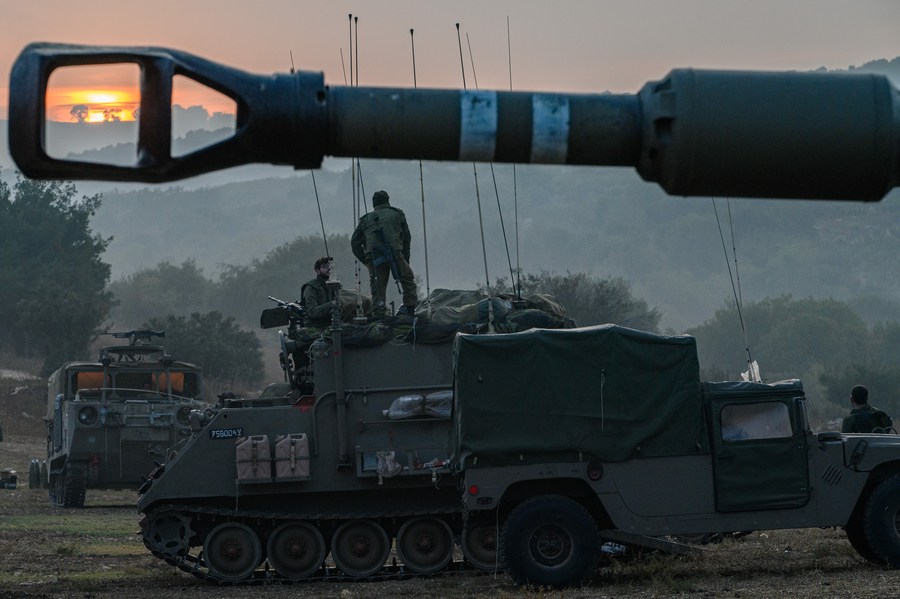
Smoke rises following an Israeli airstrike in Gaza City, October 9, 2023.
Smoke rises following an Israeli airstrike in Gaza City, October 9, 2023.
Editor's note: Steven Sahiounie, a special commentator on current affairs for CGTN, is the Chief Editor of MidEastDiscourse.com and two-time award-winning journalist. The article reflects the author's opinions and not necessarily the views of CGTN.
On October 7, Hamas, the group that controls Gaza, launched a rare surprise attack on Israel that led to massive retaliatory airstrikes on Gaza and other punitive measures, including power outages.
Huge casualties and humanitarian disaster
This new round of the Hamas-Israeli conflict has pushed the Palestinian death toll to more than 2,200, with over 8,700 injuries, according to the Palestinian Health Ministry on October 14. The Israeli fatalities since October 7 have reached around 1,300, while nearly 3,400 were injured, Israeli media reported on October 13, citing official sources.
The Israeli response has been a siege and air attack on Gaza, which holds about 2.3 million civilians who have found it nearly impossible to leave the area under the current situation. Gaza has hence been described as the "largest open-air concentration camp on earth."
The Palestinian civilians are trapped, and some do not support Hamas, but are caught as innocent bystanders in an armed conflict, between Hamas and Israel. Resistance to an occupation is guaranteed by international law, but the targeting of civilians is prohibited.
Yet, we are now witnessing a growing humanitarian disaster. Israel has prevented all food, water, fuel and electricity from being supplied to Gaza. Israel claims this is because it is in a state of war, and it considers the people in Gaza "the enemy." Jennifer Austin, director of the United Nations Relief and Works Agency for Palestine Refugees (UNRWA) reported they have run out of food, water and shelter for displaced Palestinians.
The current ongoing conflict in Gaza is also threatening to grow and engulf the whole Middle East. Many experts warn of an impending regional war, which may include Israel, Lebanon, Syria and possibly Iran.
Experts believe the catalyst which would spark an escalation into a broader war, might be the ground invasion planned by Israel. Israel's military has told more than a million people living in the northern Gaza Strip to evacuate, to move south in the besieged enclave, as fighting between it and Hamas continues.

Israeli military vehicles in northern Israel near the border with Lebanon, October 8, 2023. /Xinhua
Israeli military vehicles in northern Israel near the border with Lebanon, October 8, 2023. /Xinhua
Spillover effects
And the spillover effects might cause even more casualties and other consequences as well.
Israel and several Arab countries have signed a normalization agreement called by the U.S. administration, the Abraham Accords. Arab countries like UAE, Bahrain, Sudan and Morocco have signed, and Israeli Prime Minister Benjamin Netanyahu said in late September that it was "likely" Israel will reach a normalization agreement with Saudi Arabia, in what would mark a seismic foreign policy shift for both countries as they edge closer to reaching a deal mediated by the U.S.
However, Saudi Arabia has signaled that the negotiating process has ceased in light of the current ongoing conflict in Gaza. The Saudi Arabian Crown Prince Mohamed bin Salman had previously had a policy which supported the creation of a Palestinian State before normalization could occur, and recent negotiations were coming close to an agreement between Israel and Saudi Arabia; but that is now halted.
Israel has told Chevron to shut down a major natural gas field amid the latest round of conflict, which caused European gas prices to rise. Rising prices in gas and oil would reflect uncertainty over whether the conflict will widen to a regional conflict.
While the conflict so far has not impacted oil supplies, the future is uncertain. The U.S. and Israel are looking for a link between the Hamas attack and Iran. Tehran denies a link, but if the U.S. and Israel manufacture a link to Iran, then that may lead to a cut in Iranian oil output. Experts warn that if the Strait of Hormuz was affected, the price of oil could go way above $100 per barrel.
If gas and oil prices skyrocket because of the conflict that will make inflation even a bigger problem on both sides of the Atlantic, people will be further engulfed in a cost of living crisis.
Talks and peace needed, not more arms and violence
The Foreign Ministry of China has stated, "the fundamental way out of the conflict lies in implementing the two-state solution and establishing an independent State of Palestine."
Although the U.S. agreed to the UN resolution which outlines the two-state solution between Israel and Palestine, more peace talks, or negotiations should be promoted by the U.S.
Besides China, other nations such as Russia, and the 22 member states of the Arab League have also urged the implementation of a two-state solution as outlined in UN resolution 194. In November 2013, the newest resolution was passed 165 to 6, with 6 abstentions, with Israel and the United States voting against. The American response to the situation is to move yet another aircraft carrier to the eastern Mediterranean.
America should not be blamed alone, as the European Union, Canada, and Australia among others have followed the directives of Washington, D.C. The so-called Western world has lined up like toy soldiers to march to the orders of the policy of the White House.
The international community shouldn't stand idly by while watching the suffering, hunger and thirst of those who are suffering in the conflict and with nowhere to hide. The right way to advance the two-state solution is to resume peace talks as soon as possible. All mechanisms for peace must play a positive role.
(If you want to contribute and have specific expertise, please contact us at opinions@cgtn.com. Follow @thouse_opinions on Twitter to discover the latest commentaries in the CGTN Opinion Section.)